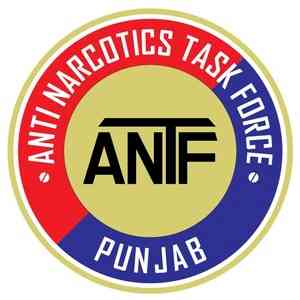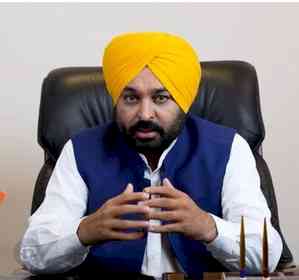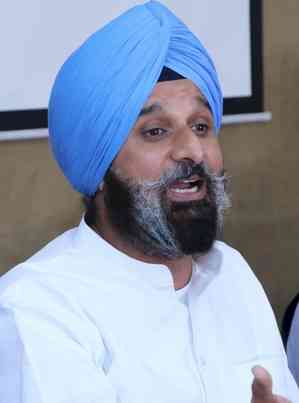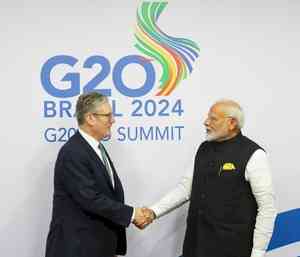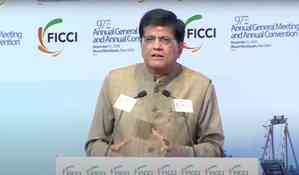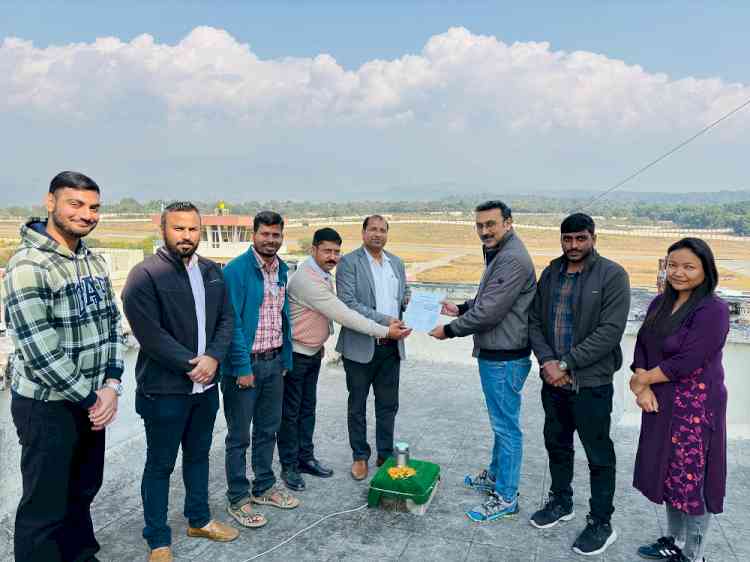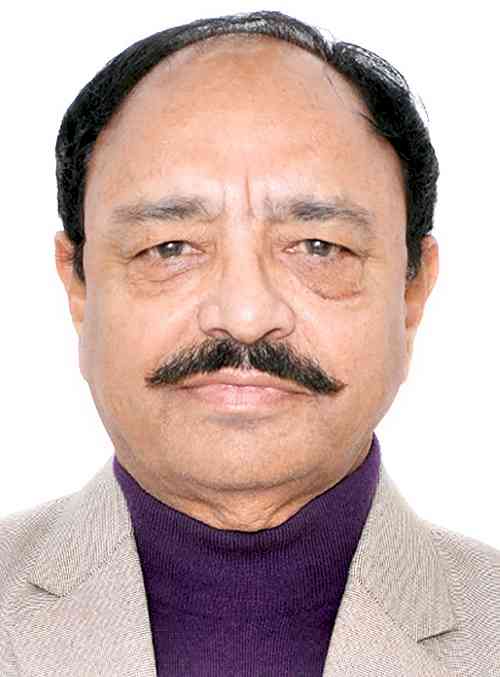“USE PAU RECOMMENDED VARIETIES TO ENSURE BETTER PRODUCE” URGES PAU VC AT KISAN MELA HELD AT KVK NAG KALAN
PAU kick started its Kisan Mela league with the foremost Mela held today at at KVK Nag Kalan, Amritsar. Held amidst much fervour and enthusiasm today, the heavy footfall of farmers and agricultural enthusiasts marked its success. The Kisan Mela celebrated the theme of ‘Celebrate the Colours of Scientific Agriculture with the Kisan Melas of PAU’.
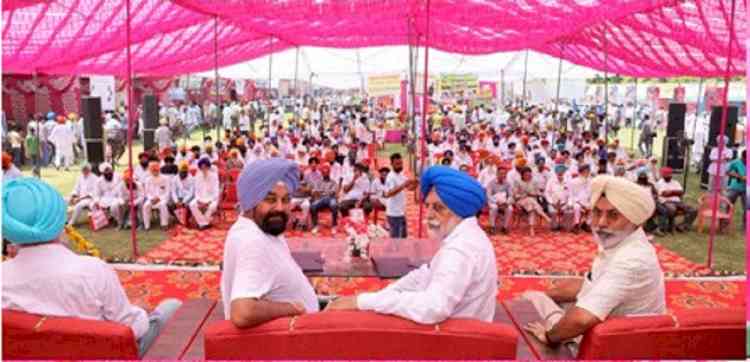
Ludhiana, September 5, 2023: PAU kick started its Kisan Mela league with the foremost Mela held today at at KVK Nag Kalan, Amritsar. Held amidst much fervour and enthusiasm today, the heavy footfall of farmers and agricultural enthusiasts marked its success. The Kisan Mela celebrated the theme of ‘Celebrate the Colours of Scientific Agriculture with the Kisan Melas of PAU’.
Inaugurating the Mela, the Chief Guest of the day, Vice Chancellor of PAU, DR S. S Gosal emphasised that “the seeds of given by PAU are guaranteed products that ensure your faith in us”. He urged the farmers to visit the demonstration plots and exhibits put up by the University after years of research, and revert with their honest feedback after adopting the recommended varieties, techniques and literature in their respective fields. He further highlighted the issues of crop residue management and judicious use of water as the priority areas in research and its adoption by farmers. While addressing the gathering, he exhorted the farmers to use short duration varieties, use biofertilizers and work on diversification of farm incomes. On the issue of stubble burning, the Chief Guest briefed about the visible dangers posed to human health by burning crop stubble and sought attention to the invisible annihilation of the soil microorganisms that takes place due to the heat generated in the soil during burning of residue. This, he reiterated, depletes the soil of its nutrients, thereby affecting agricultural productivity. He advised the farmers to use the new technology propagated by the University called surface seeding to tackle the problem of stubble burning.
Dr Satbir Singh Gosal, further, urged the farmers who have come from far-off places to adopt the integrated farming model as it not only provides a sustainable agricultural model but also augments the income of the farmers. He urged the farmers to use PAU recommended varieties like GSC 7 that give good quality mustard oil much in tune with the quality standard of the Canola oil. While taking of the surface seeding technique, he also emphasised the importance of custom hiring of agricultural machinery for tackling the problem of stubble burning and ensuring bumper produce. Dr Gosal exhorted the audience to reap double benefits of controlled expenditure in the form of improved soil health and more savings. Since, the Majha belt dominates in Basmati cultivation, Dr Gosal advised the farmers to use University recommended seed and fungicides to prevent residue retention. Pointing towards reasonable agricultural income even during the olden days, he termed excessive and avoidable expenditure by farmers on farm inputs and social functions as the chief reason for lack of savings. He also urged the young farmers to take training in agricultural marketing so that the farmers can become self-sufficient in the marketing of their produce and, thereby, increase their farm income.
Earlier, while welcoming the dignitaries Dr Gurmeet Singh Buttar, Director of Extension Education, PAU, Ludhiana, presented a bouquet to the Chief Guest. In his welcome address, he urged the farmers to not use banned pesticides as they not only corrupt the crop but also pollute the soil. He emphasized on the need to sow varieties like PBW 826 to ensure better produce. He also advised the farmers to put an end to stubble burning as it can be used as organic urea for the subsequent crop. He reiterated the need to save the ecological heritage of our lands so that agriculture remains a profitable profession for long. Dr Buttar further, urged the farmers to increase the farm income through viable subsidiary sources of income. While delineating about the importance of knowledge assimilation in practical farming, he referred to the University publications as reliable sources for enhancing farm knowledge.
On this occasion, the subject matter experts catered to the queries of the farmers and apprised them of the University varieties and advisories that should be followed religiously by the stakeholders. Dr Ajmer Singh Dhatt, Director of Research, PAU briefly delineated the research achievements of the University. He asserted that the University is now focusing its lenses on the nutrient quality of the farm produce. In this direction, he pointed towards the newly recommended Punjab Chappati 1. He urged the farmers to use varieties recommended by the University and prefer those varieties that are time-efficient. He highlighted that a total of 930 PAU recommended varieties have been approved nation-wide. While talking about the increasing cases of diabetes in Punjabis, he exhorted the use of variety PBW resistant starch 1. He also talked about other PAU recommended varieties like PBW Zinc 2, PBW 826, PBW 869 etc. He also mentioned about the use of drone technology for pesticide spraying that is being researched at in PAU and will soon be brought among the local public. Finally, he recommended the farmers to use varieties that are time-efficient and produce-effective as advised by the University specialists.
Dr Bikramjit Singh, Associate Director (T), KVK, Amritsar, Amritsar while proposing the vote of thanks, expressed gratitude to the Chief Guest, worthy Vice Chancellor Dr S.S Gosal for sparing his valuable time for the occasion.
The function was well-conducted by Dr T S Riar, Additional Director Communication, PAU who urged the farmers to engage in a fruitful dialogue with the University specialists. He also mentioned about the B.Sc Agribusiness programme being run by PAU to felicitate the knowledge of business and marketing among young farmers. He urged the farmers to take full advantage of the trainings being organized at PAU and various KVKS so that farmers can keep themselves abreast with the latest technologies and researches.


 City Air News
City Air News 
